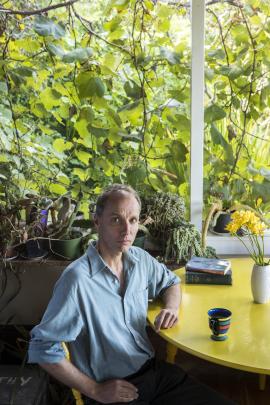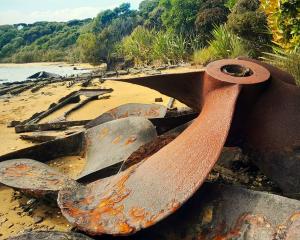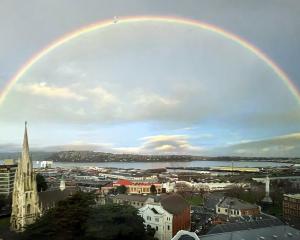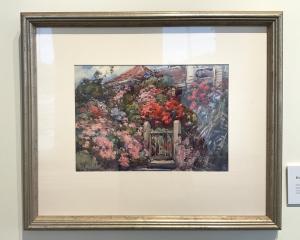One of New Zealand’s most controversial writers lives in a house he built with his own hands, Greg Bruce discovers, a reflection of the hard work he believes in.
Nicky Hager's house, which he built entirely with his own hands for less than $10,000 more than 30 years ago, is about a three-minute slippery, occasionally near-vertical, walk up a wind-blasted hill face in the expensive central Wellington suburb of Roseneath.
It took him about a year to build, although five months of that time was spent digging a hole in the hill with a pick and shovel. The house is directly behind the house of his daughter's mother, from whom he separated before they knew she was pregnant.
The two-level, two-bedroom house contains, among other things: three computers, none of which run Facebook or Twitter, not for personal use at least, an acoustic guitar, a lot of books and the board game Rummikub.
It does not contain a television, nor, as of a few months ago, his daughter, who was famously at home alone in 2014 when the police illegally raided his home in the hunt for information about New Zealand journalism's most thrillingly named confidential source, Rawshark.
The house does not, usually, contain a mobile phone, although it does at the moment, but only for the post-publication publicity madness for his new book, Hit and Run.
''It's a burner,'' he says.
The lack of a cellphone is less out of concern of being spied on - ''most people aren't being watched, including me'' - and more that he just prefers to avoid distractions from the demanding work of writing nationally significant books that dominate the news cycle for weeks, and sometimes much longer, and that sometimes fundamentally alter our collective understanding of applied power.
When he's writing, he generally does so in long, unbroken stretches of nine or 10 hours at a time, six days a week, undisturbed by social media, the checking of emails, phone calls or clandestine meetings with confidential sources in stereo-typically deserted, windswept, locations.
He wrote six books in the house he built, and he brought up his daughter there, which was by far the task he cared most about, and then he watched her move out.
''It's a very powerful experience for parents to have their children go from home,'' Hager says of that event.
''Some of them are really ready for it. For me, I was really blue.''
He went back to work. By and large, each of his books has brought down a firestorm of publicity, on both the people and organisations about which he has written, and also on himself.
John Key, to give just one example, has called him ''a well-known left-wing conspiracy theorist'', ''a massive left-wing conspiracy theorist'' and ''a screaming left-wing conspiracy theorist''.
''Because I'm such a screamer,'' Hager says, sarcastically, quietly, at his kitchen table, a week after the publication of Hit and Run.
He says the attacks don't bother him: ''I have a little saying I say to myself that has served me very well. I say, 'I will take notice of people's opinions in direct proportion to how much I respect them'.''
The flipside to that maxim is the approach he says he takes to writing about others: ''One of the great challenges I find, contrary to what any of my critics would say, is trying to be fair to people who I don't agree with, who I think have done something wrong. You know, being fair to Don Brash, being fair to bloody Cameron Slater, and none of them will think that I do that, I know that, but I know that I agonise over it and I think about their family reading what I've written. I think about them reading what I've written, and they're just a person.''
In photos, he is almost always the same. It is basically impossible to imagine him any other way: an excessively serious-looking boy-man in a series of baggy button-down shirts that, presumably, are purchased and worn specifically and exclusively for book launches.
His public image is one of a man devoted to the craft of uncovering high-level dodginess at a level of commitment that might best be described as monastic.
He is aware of this image and apparently baffled by it. He says, sweetly, almost touchingly, ''Can I ask you something? Why do people think that?''
Outside work and parenthood he is a prolific tramper and he helps organise a community choir, in which he sings. He doesn't know the good places to eat in Wellington because he can't afford to eat at them.
He says, ''I have a really fun life. I enjoy life. What is true is, I have chosen a profession where just attendance at work doesn't get you anywhere. Unless I do really hard work, there's nothing to show for it. What I will say positively about myself is that I work really hard, like I work really hard. How I achieve anything is by putting in the hundreds of hours.''
Books in New Zealand don't make much money for their authors. Dirty Politics is Hager's biggest seller and he claims to have made about $50,000 from it. An obvious lesson, possibly unlearned: hard work doesn't pay.
What meagre money he makes from his books is basically what he lives on. That cash runs down and down and down, and hopefully not out, until such time as he can produce another book. He writes occasional freelance articles, but the pay for that sort of work is most accurately described as pathetic.
His other main income stream is the kindness of friends and strangers. For instance, he met a retired doctor at a lecture a few months ago and she wrote him out a cheque that he says will be a substantial proportion of his income for that year.
Some years when he's working on a book, he says, his income is more or less zero.
Looked at through the prism of the harsh and uncertain economic realities of a solo father, Hager's whole project could be viewed as an ongoing series of leaps of faith, in which every time he has started a book, he's been at risk of being ended, economically speaking.
''I see it differently,'' he says.
''I think, 'I've only got one life'. I mean, you know: Who wants to be old and regret what they did with their life?''
His father arrived here as a refugee from Austria after many of his family were killed by the Nazis, although Hager found that out only when he was in his 30s and planning a trip to Austria. His father spoke about it then, and never again.
His father owned a clothing factory in Levin. Around the time Hager left school, his father asked him if he wanted to take over the factory. Recalling the memory, Hager laughs at it long and hard, as if the question was rhetorical, as if the acceptance of a reasonably secure offer of a materially comfortable future was the craziest thing in the world.
''He didn't expect it and no-one else would have expected it.
''I don't know why I care so little about money. Part of it is that I grew up in a comfortable well-off family and that sometimes creates people who want to have the same thing, but in my case it just means I don't care about money.''
His own family is him and his daughter, who for most of the past 25 years, lived together alone in the house he built. He misses her presence.
Faced recently with somebody who has three children under the age of 4, Hager said of that person, ''Lucky you''. Asked if he meant that sarcastically, Hager (58) replied, ''No, I'd jump back there tomorrow.
''Being a parent has been probably the most enriching and delightful part of my life and definitely it came before my work. Totally it came before my work.''
When his daughter was young, he would make up a new story for her every night at bedtime, and when she was older, they would play Rummikub together over meals. Their life together was, he says, ''years of fun and warmth and games and books and stories. The structure of my life was this really delightful year after year, day after day with this young person, my child,'' he says.
''That's just the basis of a fun life really.''
''For me, it possibly saved me from myself, because, if I hadn't been a parent, I think I would have worked all the time possibly. But what I learned really early on with being a parent was that for me, I didn't want to have my dear little child chattering away to me when I was thinking about something else.
''I realised this when I became a parent. The most likely thing I could have regretted in life, the only real risk in my life that I would have as a regret would be that I hadn't been a proper parent. That's worthy of regret. So I was a conscious parent, because I was in the risk group for people that could have been a careless parent. I feel really proud of getting that right.''
He says he's proud of his daughter. He has worked hard to keep her out of his shadow, to allow her to find her own path in life.
''No expectations,'' he says.
''She shouldn't have to take over the family factory, just like I didn't.''
His first job, after leaving school at 17, was in a chemical factory, then he was a chauffeur for the Japanese embassy, responsible for driving the deputy ambassador: ''That was fun, that was cool, that was interesting,'' he says.
''I used to put the wax on and seal up their diplomatic bags.''
It was around this time that he first became interested in politics.
''It was like some genetic clock reached a certain point and I got really interested in that sort of thing,'' he says.
''Prior to that, the features of my life were a desperate wish to get away from school, fixing my V8 - brackets, comes from Levin - and in another way, unsurprising because I came from an unusual family.''
It happened ''without any doubt, simply by osmosis'', because of his parents, who were socially engaged and interested in issues. His mother, from a line of doctors, was Levin's sole counsellor for years, and later was a district councillor.
''We grew up with that and we grew up with my father, who was, I suppose you'd say, scarred by his life.''
His parents, he says, passed on to him ''the idea that life is not your playground but the point in life is social service, doing things for others.''
It was ''absolutely, irrevocably, totally instilled,'' he says.
It was when he was driving for the Japanese deputy ambassador that he heard the announcement that the first nuclear ship visit to New Zealand in many years was about to take place. He tracked down the protest organisers through the Citizens Advice Bureau, went along, ended up becoming one of the movement's key spokespeople on the issue through the 1980s, until nuclear-free legislation was passed.
''I don't know why I did that,'' he says.
''I can't remember. And then that wove itself through me, that nuclear issue.''
He went to university, studying maths, physics, economics and philosophy, then worked briefly as a researcher for the Department of Scientific and Industrial Research, and then became a builder.
Around the time he left university, he also started writing, unsuccessfully. He tried to write a book about the history of a New Zealand timber mill, but he says he didn't have the discipline or persistence to do it.
He says that building eventually taught him that, and over the next few years the amount of building he was doing decreased, his writing increased, and now, here we are, seven books, one illegal police raid, many insults, and one empty nest later.
Hager feels his work has made a difference in the world. He says he wouldn't keep going if he didn't feel like that.
Sometimes it makes more of a difference, sometimes less. He feels 2014's Dirty Politics had a big impact.
''It was to illuminate dirty tactics in our political system, which the Prime Minister's office will be more careful about now. The Whaleoil blog, despite its own pronouncements, is not even faintly as powerful an outlet for trying to harm the people they're targeting. In fact, according to the measures that I have, that book was a huge success. I'm not just saying that, I genuinely feel that. Whereas not every book I have had has been a huge success.''
In his 2000 book, Seeds of Distrust, for instance, Hager alleged that officials, under pressure from industry lobbyists, quietly changed regulations to allow genetically engineered material into the country. The Labour Government of the time hit back hard, called him names, and generally tried to discredit him.
''It was very stressful,'' he says.
''It was even stressful for me, who doesn't get very stressed.''
The stress, he says, came from, ''The ferocious effort to say it was all wrong. In which, I would say, they mostly won. This is my objective thing, looking back: There is such a thing that if everyone says you're wrong, you're near enough to wrong. It doesn't matter if you're right.''
And so we come to the book at hand, 2017's Hit and Run, the subject of much discussion, the New Zealand Defence Force's attempts to discredit his claims, Key calling him a conspiracy theorist.
The book alleges the New Zealand SAS was responsible for the death of six civilians and the wounding of 15 others in two villages that, it turned out, Hager and co-author Stephenson located wrongly on maps they included in the book.
When the mistake became clear, Hager publicly admitted it - ''swallowed my dead rat'' - and believed he had ''got the train back on the tracks.''
He says: ''What the Defence Force, I believe, aimed for, was to utterly muddy the waters, shut down the issue, heave a big sigh of relief and a laugh afterwards, and now it's gone away.
''But it's not going to go away. That's actually the key thing, that the PR trick doesn't work.''
To be fair, these were things Hager said four days before Bill English announced there would be no inquiry into the events outlined in the book.
When you're young, Hager says, you don't analyse anything, you don't think very hard about the decisions you make.
''I don't think life works that way,'' he says.
''I think it's foolishness to think that people when they're in their teens know all the options in the world and will take the right degree and hop on the railway track and head through their life doing that thing, when they probably haven't heard of the job that suits them.
''What I think happens is we have all this stuff that makes us who we are - mysterious reasons, but we do - and we're constantly coming up against opportunities which we don't even look at, or we leap at, or we have false turns where we learn our lesson and turn back again but if we're lucky we have the opportunity where we find something that actually suits us and lets us grow as a person. But it's not predictable.''
Immediately outside the front window of the house he built, on the life-threatening semi-cliff that leads down first to the road and then to the water, is an extremely unlikely feijoa tree. It hasn't just survived in this outrageously harsh location, but it consistently bears fruit.
''We're on the edge of a blasted Wellington windy hill,'' he says, looking out at the early-season signs of fruit.
''It took years to happen but it did.''
Pointing just to the tree's left, he says, ''And that's an apricot tree, that one there, which is a small miracle.
''Some parts of Wellington are sunny and still, but this is tempestuous. So yeah, it's a miracle. Wait long enough, things happen.''
This is such a gift of a literary allusion about persistence in the face of adversity that it would have been belligerent not to include it here.
He smiles, shrugs and says, ''They just grew themselves, to be fair.''













